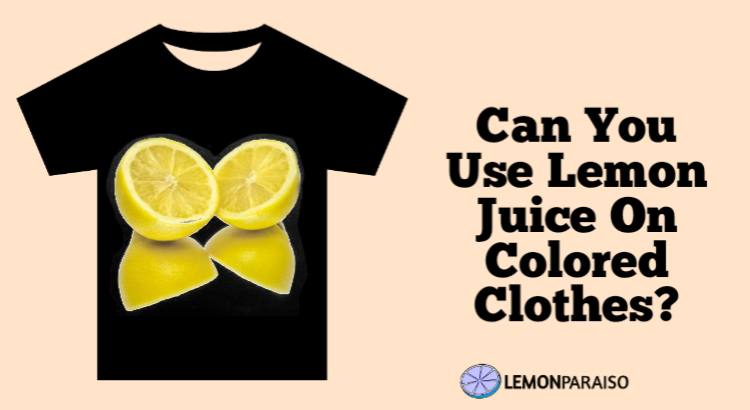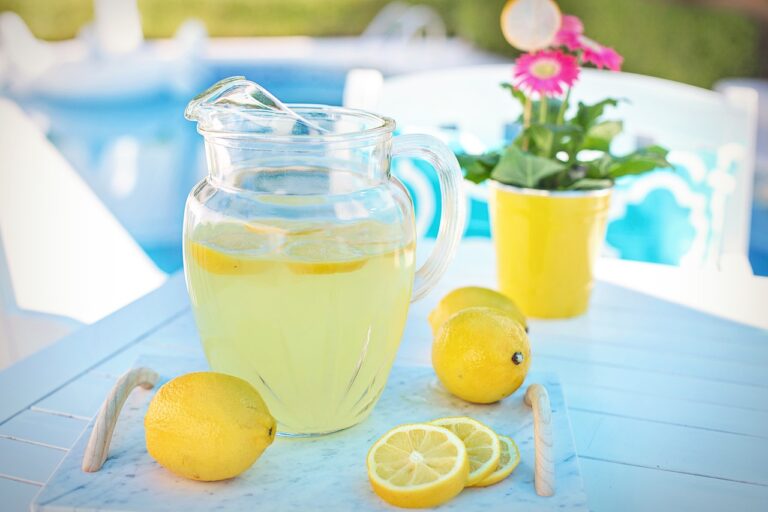Can You Use Lemon Juice On Colored Clothes?

Lemon juice, a natural and eco-friendly alternative to chemical cleaners, offers various benefits when used with caution on colored garments. From stain removal and odor elimination to serving as a natural fabric softener, lemon juice can provide a sustainable solution for maintaining the freshness and cleanliness of your colored clothes.
Can You Use Lemon Juice On Colored Clothes?
Lemon juice can be used on colored clothes with caution, as its natural bleaching properties may cause fading or color alteration. To avoid damaging the fabric or fading colors, it is recommended to test a small, inconspicuous area of the clothing item first.
Diluting lemon juice with water can reduce the risk of color damage, while still offering some cleaning benefits. Another option is to mix lemon juice with a mild detergent to further protect the colors.
When using lemon juice on colored clothes, be sure to rinse thoroughly to remove any residue that might cause damage. Overall, while lemon juice can be used on colored clothes, it is important to exercise caution and always test first.
Does Lemon Juice Stain Black Clothes?
Lemon juice is not likely to stain black clothes, but it may cause fading due to its natural bleaching properties. When using lemon juice on black clothing, it is essential to test a small, inconspicuous area first to ensure the color will not be adversely affected.
Diluting the lemon juice with water or mixing it with a mild detergent can help minimize the risk of fading. It is also important to rinse black clothes thoroughly after using lemon juice to remove any residue that could cause fading over time.
If used correctly, lemon juice can provide some benefits for black clothing without staining. However, always proceed with caution to avoid unintentional color alteration.
Can Lemon Juice Remove Stains From Colored Clothes?
Lemon juice can be effective in removing certain stains from colored clothes, such as those caused by sweat, mildew, or rust. However, due to its natural bleaching properties, it is crucial to use lemon juice with caution on colored fabrics.
Diluting the lemon juice with water can help minimize the risk of color damage while still providing stain-removing benefits. Always test a small, hidden area of the clothing item before applying lemon juice to the stain.
Gently dabbing the lemon juice onto the stain and rinsing thoroughly can often help remove the stain without causing color damage. However, for more stubborn stains, it may be necessary to seek alternative stain removal methods that are less likely to affect the colors.
How To Use Lemon Juice On Colored Clothes?
To use lemon juice on colored clothes, start by diluting it with water or mixing it with a mild detergent to minimize the risk of color damage. Always test a small, hidden area of the clothing item before proceeding to ensure the colors will not be adversely affected.
If the test is successful, gently dab the diluted lemon juice onto any stains or apply it to the entire garment for overall cleaning. Allow the lemon juice to sit for a short period of time, usually 5-10 minutes, before rinsing thoroughly with cold water to remove any residue.
If using lemon juice as a pre-treatment for stains, follow up with a regular wash cycle using a gentle detergent. Remember, while lemon juice can be beneficial for colored clothes, it is essential to use it cautiously to avoid unintentional color alteration or damage.
What Are The Benefits Of Using Lemon Juice On Colored Clothes?
Using lemon juice on colored clothes can offer several benefits, including natural stain removal, odor elimination, and mild disinfection. Lemon juice is an eco-friendly alternative to chemical cleaners, making it a more sustainable option for laundry care.
Its acidity can help break down certain stains, such as sweat or mildew, while its natural antibacterial properties can combat odor-causing bacteria. When used correctly and with caution, lemon juice can help maintain the freshness and cleanliness of colored clothes without relying on harsh chemicals.
However, it is important to always test a small, inconspicuous area of the clothing item before using lemon juice to avoid potential color damage.
Can Lemon Juice Be Used As A Natural Fabric Softener For Colored Clothes?
Lemon juice can be used as a natural fabric softener for colored clothes due to its acidity, which can help break down mineral deposits and soap residue. This can leave fabrics feeling softer and more comfortable to wear.
To use lemon juice as a fabric softener, add half a cup of diluted lemon juice to the rinse cycle of your washing machine. Ensure that the lemon juice is well-diluted to minimize the risk of color damage.
As with any other use of lemon juice on colored clothes, it is crucial to test a small, hidden area of the garment first to ensure that the colors will not be adversely affected. By using lemon juice as a natural fabric softener, you can reduce your reliance on chemical-based products and embrace a more eco-friendly laundry routine.
How Much Lemon Juice Should Be Used On Colored Clothes?
The amount of lemon juice to use on colored clothes depends on the intended purpose and the level of dilution. For stain removal, mix equal parts lemon juice and water, and apply it directly to the stain using a gentle dabbing motion.
When using lemon juice as a natural fabric softener, add half a cup of well-diluted lemon juice to the rinse cycle of your washing machine. If you are attempting to clean or freshen the entire garment, consider using a mixture of one part lemon juice to two parts water.
Always remember to test a small, hidden area of the clothing item before applying lemon juice, as its natural bleaching properties can cause color damage. Adjust the lemon juice concentration according to the results of the test to ensure the garment remains vibrant and undamaged.
Can Lemon Juice Damage The Fabric Of Colored Clothes?
Lemon juice has the potential to damage the fabric of colored clothes due to its natural bleaching properties and acidity. If used undiluted or in excessive amounts, lemon juice can cause color fading or alteration, and may even weaken the fabric over time.
To minimize the risk of damage, always dilute lemon juice with water before applying it to colored clothes and test a small, inconspicuous area first. Additionally, be sure to rinse the garment thoroughly after using lemon juice to remove any lingering residue that could continue to affect the fabric.
What Are The Alternatives To Using Lemon Juice On Colored Clothes?
There are several alternatives to using lemon juice on colored clothes, including white vinegar, baking soda, and gentle, color-safe stain removers. White vinegar is a natural, eco-friendly option that can be used for stain removal, odor elimination, and as a fabric softener.
Baking soda is another versatile, environmentally friendly option that can help remove stains, deodorize, and brighten colors. For more stubborn stains, consider using a color-safe stain remover or a mild detergent specifically designed for colored clothes.
When exploring alternatives to lemon juice, it is essential to choose options that are gentle on both the fabric and the colors to ensure the longevity of your garments.
Can Lemon Juice Be Used On All Types Of Colored Clothes?
While lemon juice can be used on many types of colored clothes, it is essential to exercise caution when using it on delicate or sensitive fabrics, such as silk or wool. The natural bleaching properties and acidity of lemon juice may cause damage to these more delicate materials.
Always test a small, inconspicuous area of the garment before using lemon juice to ensure that the fabric will not be adversely affected. In some cases, it may be more appropriate to choose an alternative cleaning method or a specialized fabric cleaner for delicate materials.
By taking the time to understand the specific care requirements of each fabric type, you can ensure that your colored clothes remain vibrant and well-maintained.

